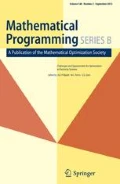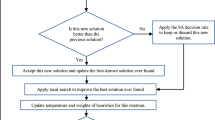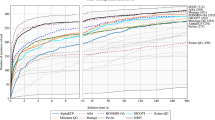Abstract
We consider the formulation of non-preemptive single machine scheduling problems using time-indexed variables. This approach leads to very large models, but gives better lower bounds than other mixed integer programming formulations. We derive a variety of valid inequalities, and show the role of constraint aggregation and the knapsack problem with generalised upper bound constraints as a way of generating such inequalities. A cutting plane/branch-and-bound algorithm based on these inequalities has been implemented. Computational experience on small problems with 20/30 jobs and various constraints and objective functions is presented.
Similar content being viewed by others
References
T.S. Abdul-Razaq and C.N. Potts, “Dynamic programming state-space relaxation for single-machine scheduling,”Journal of the Operational Research Society 39 (1988) 141–152.
J. Adams, E. Balas and D. Zawack, “The shifting bottleneck procedure for job shop scheduling,”Management Science 34 (1988) 391–401.
E. Balas, “Facets of the knapsack polytope,”Mathematical Programming 8 (1975) 146–164.
S. P. Bansal, “Single machine scheduling to minimize weighted sum of completion times with secondary criterion—a branch and bound approach,”European Journal of Operational Research 5 (1980) 171–181.
E.H. Bowman, “The schedule-sequencing problem,”Operations Research 7 (1959) 621–624.
J. Carlier, “The one-machine sequencing problem,”European Journal of Operational Research 11 (1982) 42–47.
N. Christofides, R. Alvarez-Valdes and J.M. Tamarit, “Project scheduling with resource constraints: A branch and bound approach,”European Journal of Operational Research 29 (1987) 262–273.
R.H. Doersch and J.H. Patterson, “Scheduling a project to maximize its present value: A zero-one programming approach,”Management Science 23 (1977) 882–889.
M. Dyer and L.A. Wolsey, “Formulating the single machine sequencing problem with release dates as a mixed integer program,”Discrete Applied Mathematics 26 (1990) 255–270.
A.M.A. Hariri and C.N. Potts, “An algorithm for single machine sequencing with release dates to minimize total weighted completion time,”Discrete Applied Mathematics 5 (1983) 99–109.
E.L. Lawler, “Recent results in the theory of machine scheduling,” in: A Bachem, M. Grötschel and B. Korte, eds.,Mathematical Programming: The State of the Art—Bonn 1982 (Springer, Berlin, 1983) pp. 202–234.
E.L. Lawler, J.K. Lenstra and A.H.G. Rinnooy Kan (1982), “Recent developments in deterministic sequencing and scheduling: A survey,” in: M.A.H. Dempster, J.K. Lenstra and A.H.G. Rinnooy Kan, eds.,Deterministic and Stochastic Scheduling (Reidel, Dordrecht, 1982) pp. 35–73.
J.K. Lenstra, A.H.G. Rinnooy Kan and P. Brucker, “Complexity of machine scheduling problems,”Annals of Discrete Mathematics 1 (1977) 343–362.
J.H. Patterson, R. Slowinski, F.B. Talbot and J. Weglarz, “An algorithm for a general class of precedence and resource constrained scheduling problems,” in: R. Slowinsky and J. Weglarz, eds.,Advances in Project Scheduling (Elsevier, Amsterdam, 1989) pp. 1–26.
J.C. Picard and M. Queyranne, “The time-dependent travelling salesman and its application to the tardiness problem in one-machine scheduling,”Operations Research 26 (1978) 86–110.
M.E. Posner, “Minimizing weighted completion times with deadlines,”Operations Research 33 (1985) 562–574.
C.N. Potts and L.N. Van Wassenhove, “An algorithm for single machine sequencing with deadlines to minimize total weighted completion time,”European Journal of Operational Research 12 (1983) 379–387.
A.A.B. Pritsker, L.J. Watters and P.M. Wolfe, “Multiproject scheduling with limited resources: A zero-one programming approach,”Management Science 16 (1969) 93–108.
C.N. Redwine and D.A. Wismer, “A mixed integer programming model for scheduling orders in a steel mill,”Journal of Optimization Theory and Applications 14 (1974) 305–318.
A.H.G. Rinnooy Kan, B.J. Lageweg and J.K. Lenstra, “Minimizing total costs in one-machine scheduling,”Operations Research 23 (1975) 908–927.
J. Shwimer, “On then-job, one-machine, sequence-independent scheduling problem with tardiness penalties: A branch-bound solution,”Management Science 18 (1972) B-301–B-313.
J.P. Sousa, “Time indexed formulations of non-preemptive single-machine scheduling problems,” Ph.D. Thesis, Faculté des Sciences Appliquées, Université Catholique de Louvain (Louvain-la-Neuve, Belgium, 1989).
F.B. Talbot, “Resource-constrained project scheduling with time-resource tradeoffs: The nonpreemptive case,”Management Science 28 (1982) 1197–1210.
L.A. Wolsey, “Valid inequalities for 0–1 knapsacks and mips with generalised upper bound constraints,”Discrete Applied Mathematics 25 (1990) 251–261.
Author information
Authors and Affiliations
Additional information
The research of this author was partially supported by JNICT/INVOTAN under grant No. 30/A/85/PO and by the PAC, contract No. 87/92-106, for computation.
Rights and permissions
About this article
Cite this article
Sousa, J.P., Wolsey, L.A. A time indexed formulation of non-preemptive single machine scheduling problems. Mathematical Programming 54, 353–367 (1992). https://doi.org/10.1007/BF01586059
Received:
Revised:
Issue Date:
DOI: https://doi.org/10.1007/BF01586059




